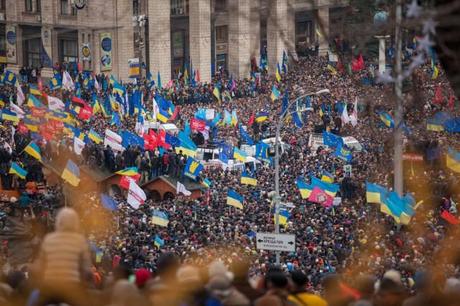
Ukraine’s “Euromaidan” protests were driven by activists fed up with corruption. Can the new government turn things around?
When it comes to opportunity for anti-corruption reform on a massive scale, few countries have ever been as ripe for change as Ukraine today. Western countries and the International Monetary Fund are pushing hard for transparency and clean government. They enjoy unprecedented leverage over Ukraine’s political and economic elites, who need billions in loans to stave off economic ruin. Ukraine’s populace, which took to the streets a year ago to oust a president reviled for his flamboyant corruption, is maddened at the lack of a single, high-profile corruption prosecution since then. Investors, once attracted to Ukraine by a highly educated workforce, cheap industrial assets, and some of the world’s most fertile farmland, have made it clear that corruption is a deal breaker.
Freshly elected Ukrainian leaders committed to reform and European integration are taking seemingly drastic steps on the anti-corruption front. In October, they passed an impressive package of laws that provide the framework to investigate, prosecute and imprison wrongdoers. Just as important, the new laws require the training and monitoring of the tens of thousands of public servants – from traffic cops to school principals to MPs – who collectively represent the “demand side” of Ukraine’s corruption equation.
To implement these new laws and flesh out the details, Ukraine’s elected leaders are turning to technocrats from countries counted as anti-corruption success stories – mostly Georgia and Lithuania. They are laboring away this winter in various ministries and in the Presidential Administration, trying to figure out how to train and empower the men and women who, in the face of a decades-old corruption culture and vastly outnumbered by colleagues benefiting from the status quo, will be the shock troops of anti-corruption reform. Taken together, these are impressive, ambitious moves in a country of 45 million, by far the largest state in the post-Soviet space to attempt such a housecleaning.
All this was on display last week during a fact-finding mission by CIPE’s lead anti-corruption expert in Ukraine, Drago Kos, who also serves as the chairman of the Working Group on Bribery of the Organisation of Economic Cooperation and Development. Kos, a plainspoken man who began his career in the Slovenian police force, spent a week in Kyiv, building rapport and sharing opinions with the Ukrainians at the forefront of the anti-corruption effort.
At Ukraine’s General Prosecutor’s Office, long viewed as the home of the fox guarding the hen house, Kos reached a consensus on the folly of having two or more agencies empowered to prosecute high-level corruption.
In the offices off the long, red-carpeted corridors of the Presidential Administration, Kos empathized with slightly overwhelmed young Ukrainian administrators recently plucked from the world of international business and Georgian experts enduring a Kyiv winter.
At the American Chamber of Commerce and the European Bank for Reconstruction and Development, he emphasized that, yes, Ukraine must fight corruption, but in a way that doesn’t create another layer of bureaucracy that would stymie badly needed economic development.
Through all these encounters, and in more casual conversations, came a strong sense that Kos knows what to do. He’s quick to dismiss the arguments – often based on the limp logic of cultural and historical exceptionalism – that Ukrainians are simply incapable of another path, that the only way to smooth the hard edges of a dysfunctional bureaucracy is through a little palm greasing. He points to concrete solutions that worked in his native Slovenia and other post-Communist, Eastern European states.
What will happen next on the corruption front in Ukraine? It’s an open question. The country’s political leadership is understandably distracted by a war with separatists in the East. The country’s billionaire oligarchs and regional “mini-garchs” are understandably wary of anti-corruption measures that might not only shut down revenue streams but begin to look at how they accumulated all that wealth in the first place.
This winter and spring are key. Ukraine’s president will choose who will head the new anti-corruption law enforcement agency. Ukraine’s government will begin staffing and organizing the national body charged with preventing corruption by educating and watchdogging officials. The Ukrainian people will be marking the one-year anniversary first of the shooting deaths of over 100 Kyiv street activists killed for protesting a rotten system, and then of the election of a president who came to power promising clean government.
Whatever happens in the coming months, Kos, working with CIPE’s USAID-funded anti-corruption team, will be a frequent fixture in Kyiv. If last week was any indication, he’ll have the ear of Western diplomats, access to big business and lenders, and a bully pulpit provided by CIPE’s national network of business associations representing entrepreneurs watching that anti-corruption campaign closely. Those are the same entrepreneurs who fed, clothed, and joined the street protesters who toppled a corrupt regime a year ago.
Frank Brown is a Senior Program Officer for Eurasia and Value Chain/Anti-Corruption Program Team Leader at CIPE.


posted on 18 April at 06:58
Want to learn languages?Want to become an Online Teacher?Then why waiting follow http://preply.com/en/ukrainian-by-skype,i am following too,and have helped me a lot.